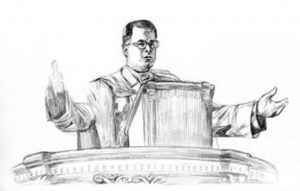
Jesus and the Sabbath
Apart from His claim to be the Messiah, there is no subject on which our Lord came into such sharp conflict with the religious leaders of the Jews as in the matter of Sabbath observance.
He set Himself squarely against the current rabbinic restrictions as contrary to the spirit of the original law of the Sabbath.
The rabbis seemed to think that the Sabbath was an end in itself, an institution to which the pious Israelite must subject all his personal interests; in other words, that man was made for the Sabbath: man might suffer hardship, but the institution must be preserved inviolate.
Jesus, on the contrary, taught that the Sabbath was made for man’s benefit. If there should arise a conflict between man’s needs and the letter of the Law, man’s higher interests and needs must take precedence over the law of the Sabbath (Matthew 12:1-14; Mark 2:23 through 3:6; Luke 6:1-11; also John 5:1-18; Luke 13:10-17; Luke 14:1-6 ).
There is no reason to think that Jesus meant to discredit the Sabbath as an institution. It was His custom to attend worship in the synagogue on the Sabbath (Luke 4:16 ).
The humane element in the rest day at the end of every week must have appealed to His sympathetic nature.
It was the one precept of the Decalogue that was predominantly ceremonial, though it had distinct sociological and moral value.
As an institution for the benefit of toiling men and animals, Jesus held the Sabbath in high regard.
As the Messiah, He was not subject to its restrictions; He could at any moment assert His lordship over the Sabbath (Mark 2:28).
The institution was not on a par with the great moral precepts, which are unchangeable. It is worthy of note that, while Jesus pushed the moral precepts of the Decalogue into the inner realm of thought and desire, thus making the requirement more difficult and the law more exacting, He fought for a more liberal and lenient interpretation of the law of the Sabbath.
Rigorous sabbatarians must look elsewhere for a champion of their views.
4. Paul and the Sabbath:
The early Christians kept the 7th day as a Sabbath (day of rest), much after the fashion of other Jews, but from the beginning they also had meetings on “the day of the Lord”, in remembrance of His resurrection. Because of this the 1st day of the week gradually came to became known and recognized as the day on which the followers of Jesus would meet for worship.
The resurrection of our Lord on that day made it for Christians the most joyous day of all the week.
When Gentiles were admitted into the church, the question at once arose whether they should be required to keep the Law of Moses.
It is the glory of Paul that he fought for, and won freedom, for his Gentile fellow-Christians.
It is significant of the attitude of the apostles that the decrees of the Council at Jerusalem made no mention of Sabbath observance in the requirements laid upon Gentile Christians (Acts 15:28 f).
Paul boldly contended that believers in Jesus, whether Jew or Gentile, were set free from the burdens of the Mosaic Law.
Even circumcision counted for nothing, now that men were saved by believing in Jesus (Galatians 5:6). Christian liberty as proclaimed by Paul included all days and seasons.
A man could observe special days or not, just as his own judgment and conscience might dictate (Romans 14:5 f); but in all such matters one ought to be careful not to put a stumblingblock in a brother’s way (Romans 14:13 ff). That Paul contended for personal freedom in respect of the Sabbath is made quite clear in Colossians 2:16 f, where he groups together dietary laws, feast days, new moons and sabbaths.
The early Christians brought over into their mode of observing the Lord’s Day the best elements of the Jewish Sabbath, without its onerous restrictions.
~~~~~
The abbreviation ff. is used in citation to refer to a section for which no final page number can usefully be given. When used, ff. has no space between it and the preceding number and is followed by a full stop. If there is only a single section following, f. may be used instead.
When used, f. has no space between it and the preceding number and is followed by a period. If more than one following section is meant, ff. is used.
~~~~~
Literature with this series:
J. A. Hessey, Sunday, Its Origin, History, and Present Obligation (Bampton Lectures for 1860); Zahn, Geschichte des Sonntags , 1878; Davis, Genesis and Semitic Tradition , 1894,23-35; Jastrow, “The Original Character of the Heb Sabbath,” AJT , II, 1898,312-52; Toy, “The Earliest Form of the Sabbath,” JBL , XVIII . 1899,190-94; W. Lotz, Questionum de historia Sabbati libri duo , 1883; Nowack, Hebr. Arch ., II, 1894,140 ff; Driver, HDB , IV, 1902,317-23; ICC , on “Gen,” 1911,35-39; Dillmann, Ex u. Lev3 , 1897,212-16; Edersheim, Life and Times of Jesus the Messiah , II, 1883,51-62,777-87; Broadus, Commentary on Mt , 256-61; EB , IV, 1903,4173-80; Gunkel, Gen3 , 1910,114-16; Meinhold, Sabbat u. Woche im Altes Testament , 1905; Beer, Schabbath , 1908.





